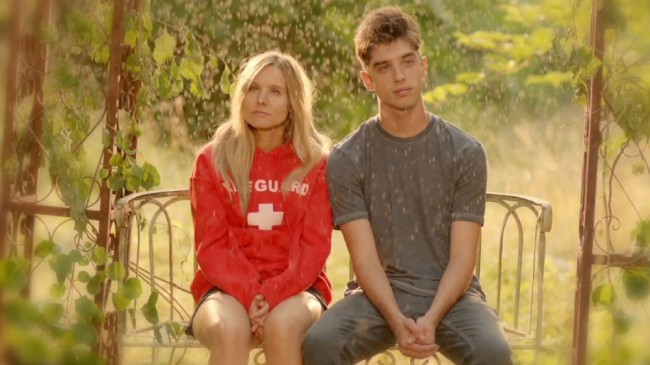Disclaimer: This review contains spoilers for The Lifeguard (2013) movie. Please do not read this review until you see it.
Introduction
The Lifeguard (2013), directed by Liz W. Garcia, continues the indie movie trend of disillusioned youth. However, the film takes this concept a step further by showing the consequences of trying to redo your teen years. Despite the emotionally charged performances from the cast, The Lifeguard’s cliche storylines, no-sense of moral justice and awkward sound-scene pairings makes it almost as unfocused as its main heroine.
Plot Summary
Leigh (Kristen Bell), unhappy with her life as a journalist, decides to returns home. Immediately, she reunites with her old friends Mel (Mamie Gummer) and Todd (Martin Starr). Both of their lives seem as unhappy as Leigh’s; they’re just better at suppressing them. At 30, Todd still hides his homosexuality, and Mel is a vice-principal trying to have a child in a miserable marriage.
Continuing her dive back into her old life, Leigh becomes a lifeguard again, like she was in high school and college. By the pool she meets Little Jason (David Lambert). At first Leigh acts a guardian and mentor for Little Jay and his friends, especially Matt (Alex Shaffer). However, eventually Leigh and Little Jason begin an affair.
Important Themes
Depression is huge theme of the movie, and the bad choices people make because of it. Leigh’s depression because of her lack of direction results in her criminal affair. Todd’s depression over never leaving his town and accepting his sexuality, leads him to the attempt seduction of a child. Mel’s depression over her marriage and possibility of becoming a mother, causes her to ignore her friends criminal acts. Matt’s depression over his life, makes him the only victim of his depression by committing suicide. His suicide sparks a series of events that will help these characters face their depression and attempt to conquer them. If there is a moral lesson in The Lifeguard, it’s to never ignore your problems by numbing the pain, but to face them. Only through actions can you heal from them.
Overall Impression
The Lifeguard shows a lot of different degrees of self destruction, some of them in a very realistic manner. The look at depression and self harm was the strongest portion of the film. However, one thing that didn’t work for the film is the usage of music, especially in driving scenes. The music didn’t have the transcendent nature that was needed for these types of moments. These scenes feel less authentic, and they distracted from watching the interaction between the characters.
Another very weak point of the film was the lack of consequences for criminal actions. The Lifeguard never fully took charge against Leigh or Todd for their sexual behavior towards teens, which clearly hinted of some type of psychological issue, but was never addressed. Even if viewers are supposed to assume Leigh was attracted to Little Jason for his old soul, none of his actions made this believable. Besides Leigh not being punished, one of the most ridiculous moments in the film was when Mel did not lose her job at all. There is no way she would have been allowed to continue to work at a school after that. The entire outcome of Leigh’s affair with Little Jason felt so incredible unrealistic that the film became almost like a poorly written comedy.
Mel’s storyline about questioning whether she wanted to have a baby gave the film a cliche nature, and further discredited the seriousness of the movie. Nothing about Mel or her husband screamed “good parents,” or warranted them staying together in the end.
Conclusion
While watching The Lifeguard, I thought of Dawson’s Creek. The show has a nostalgic nature to it (both culturally and thematically). As an adult you can easily watch a marathon of it, because it allows you to relive a part of your youth. However, you will never be able to recapture the original innocent magic you felt watching it for the first time. You’re too mature to not understand how unrealistic it depicts teen life. The same goes for The Lifeguard. Anyone mature knows how this film unauthentically depicts adults and consequences. Therefore, rendering you from ignorantly enjoying it.
5/10



